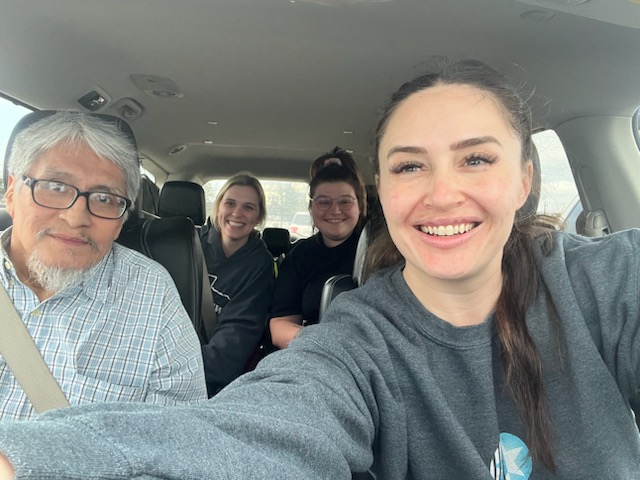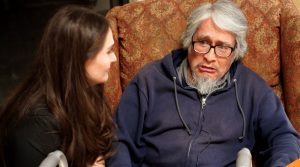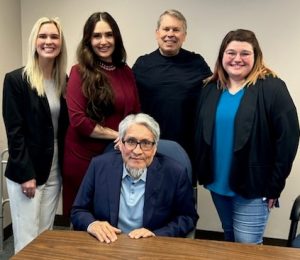
It’s not unusual. A man gets arrested for murder. He swears he’s innocent, but he’s convicted at trial and sentenced. He appeals, loses and he’s largely forgotten by everyone in the outside world as he sits in prison.
This is not that story.
Yes, James Harry Reyos was sentenced to 38 years in prison for the murder of the Rev. Patrick Ryan. Yes, he lost his appeal and yes, he did 20 years before being paroled. But Reyos and his protestations of innocence were not ignored or forgotten.
And now, 40 years later, Reyos just might have a shot at being exonerated.
If he is, he’ll have himself to thank along with a bishop, a prosecutor, newspaper reporters, book authors, podcasts, A&E, Odessa Police Chief Michael Gerke’s kids and, ironically, a group of cops and prosecutors, some of them who weren’t even born when Ryan died.
“James has never given up and he just keeps on pushing and pushing and pushing and I think what we see today is the result of 40 years of James not giving up on himself and on proving his innocence,” said Allison Clayton, deputy director of the Innocence Project of Texas.
Ryan’s bloodied, bound and battered body was found at the Sand and Sage Motel in Odessa in December 1981. The Ireland native’s stolen car was found at a Moose Lodge in Hobbs, N.M., and his wallet was found at a nearby gas station.
Eleven months later, a drunk and stoned Reyos, 27, called Albuquerque police and confessed to having killed the 49-year-old priest, with whom he’d had a sexual encounter. He then recanted.
An Ector County jury convicted Reyos, a 27-year-old Chama, New Mexico man and sent him off to prison.
Growing support

Reyos’ conviction was affirmed in November 1984, but in December 1991, the prosecutor who represented the state during the appellate process had a change of heart. Dennis Cadra sent a letter to then Gov. Ann Richards asking for Reyos’ conviction to be overturned.
Cadra had timestamped receipts, a traffic ticket and an eye witness who placed him in Roswell, N.M., at the time of the slaying and there was no physical evidence linking him to the gruesome murder. Cadra pointed out Reyos would have had to drive 120 miles an hour to get from Roswell to Odessa and back again in order to commit the murder during the right time frame.
Ryan’s supervisor, a bishop, came out in support of Reyos, as did members of both the New Mexico and Texas Legislatures. Journalists from the Austin American-Stateman and Houston Chronicle wrote about the case. A book was published and A&E did a segment on Reyos. His plight was also featured on numerous podcasts.
It was one of those podcasts that caught the attention of OPD Chief Gerke’s kids, who mentioned it to their father, said Greg Barber, the first assistant Ector County District Attorney.
Gerke then asked his staff to look into the case, Barber said.
In January 2022, Barber said he received a call from OPD Captain John Sykes who asked to sit down with him.
“I thought he wanted to talk about a recent case and I asked him if I needed to bring a file. He said ‘We believe someone may have been wrongfully convicted,’” Barber said.
Sykes and others at OPD had pulled their case files and after reviewing them had “serious doubts” about Reyos’ guilt, Barber said.
The records
When he got back to the office, Barber said he went on a hunt for the trial transcripts.
Barber, 54, and a former law enforcement officer himself, reviewed the transcripts and the police files. He then asked Deputy Ector County Attorney Carmen Villalobos, 30, to review them as well.
“I wanted a different abstract look at it. I didn’t tell her what I thought,” Barber said.
It turns out, they both had developed doubts about Reyos’ guilt.
“From what I read, there was doubt as to whether he could have been here in Odessa during the right time frame or even that he was capable of this,” Barber said. “Although he had an alcohol problem, there was no indication he had a violent side to him. There was no history of violent behavior. In fact, it was quite the opposite. He seemed to be a timid, quiet individual.”
Although he’d been arrested before, he’d never resisted or assaulted an officer, Barber said.
Villalobos said she read the trial transcript in one night.
“I couldn’t put it down,” Villalobos said. “I felt confident that he did not commit this crime.”
Physical evidence
In the meantime, OPD went on a hunt to find out if any of the physical evidence from the case still existed. It was a long shot, given the age of the case and the fact Reyos’ conviction had been upheld, Barber said.
They found fingerprints.
At that point, Barber reached out to Clayton, who was his mentor at Texas Tech University of Law, to ask for a meeting. The Lubbock resident sat down at OPD with Barber, Villalobos, Sgt. Scottie Smith and fingerprint analyst Stacy Kennedy.
“There was no sense in being adversarial,” Barber said. “Justice is about finding the truth and doing what’s right by the law. It’s not just about convicting someone.”
Villalobos, who joined the Ector County District Attorney’s Office straight out of law school just under five years ago, pointed out that hanging in their lobby is a mission statement that says just that.
They also put themselves in Reyos’ shoes, they said. Wouldn’t they want someone to stand up for them?
Throughout the entire process, Barber and Villalobos had conversations with Ector County District Attorney Dusty Gallivan and other veteran prosecutors about the details.
Studying and prosecuting cold cases isn’t unusual.
Studying and possibly working to exonerate someone who has already gone through the appellate process is.
Alternative suspects
Clayton said three sets of fingerprints were found at the murder scene. One set was covered in blood and matched those found in Ryan’s car and on his wallet.
She’s convinced those individuals, long deceased, are responsible for Ryan’s death.
According to OPD, Ryan’s case has been re-opened as a cold case investigation.
This week, Clayton asked 70th Ector County District Judge Denn Whalen to hold a hearing and to issue “findings of fact and conclusions of law.”
If he believes Reyos is innocent, he can ask the Texas Court of Criminal Appeals to reverse the conviction, Clayton said.
“They’re under no deadline. It could be, six weeks, six months, six years. The longest I’ve seen them take in recent memory is three years,” Clayton said.
Barber stressed he and Villalobos are not condemning the prosecutors who presented their case to the jurors, or the jurors themselves.
“We were not there in the courtroom,” Barber said.
It’s difficult judging just from the transcripts how the evidence was presented, how the witnesses came across or what the jurors’ reactions were, he said.
In addition, back in the early ’80s, law enforcement could only compare fingerprints with known suspects, Barber said.
Bright future?

Under Texas law, if Reyos is exonerated, he would be entitled to a lump sum payment of $80,000 for every year he was incarcerated, she said. He’d also be entitled to $80,000 per year for the remainder of his life and $50,000 a year per year for the time he’s served on parole. The legislature set aside funds specifically for the wrongful convicted, she said.
Reyos, now 66, isn’t thinking about that.
“Right now, I’m concentrating on exoneration. Anything that happens thereafter, if it happens, it happens and if it doesn’t, it doesn’t,” Reyos said in a phone interview from his home in Austin. “My main goal is to get exonerated so I can go home to New Mexico and see my family.”
While in prison, he lost his father and a sister and wasn’t allowed to go to their funerals as they were outside Texas. His remaining family includes multiple brothers and his brothers’ families. While in prison, his family was only able to make the long drive to visit him once due to work schedules and the expense. Thankfully, he said, the warden allowed them to visit on two consecutive days when only one weekly visit was normally allowed.
Clayton said she believes Reyos is trying not to get too excited because he’s been crushed in the past.
”He’s had some really good pushes for exoneration in the past like when Cadra came forward on his behalf and the Catholic Diocese. The New Mexico legislature passed an entire resolution asking Texas to pardon James. All this stuff happened and nothing came of it and so it’s happened a couple of times where his hopes get really, really built up and for good cause because it’s looking good, and then just the bottom falls out of it.”
Clayton said she and some law school students who have been assisting on the case will drive from Lubbock to Austin to pick up Reyos for the hearing before Whalen. It’s not yet been scheduled.
“I want to make sure in all my cases that the judge knows my guy’s name and that you know his face. That way if you’re gonna work a further injustice on him than I hope his face haunts your dreams. It’s kind of dark, but yeah, I want them to know this is a real live person with people who really do care about him, who would do anything for him. There’s a lot of people watching the case and that’s the importance of press coverage,” Clayton said.
Positive attitude
Reyos, who is recovering from a stroke he had in September, said he lives day-by-day and denies being angry about the past.
There were a few problems his first few years in prison, but for the most part his fellow inmates came to believe in his innocence, he said. Many encouraged him to never give up. He worked as a teacher’s aide in prison, helping others obtain their GED.
“I’m a peaceful person. I get along with people. Sure, I’ve been mistreated, but, you know, I overlook that because I can’t change that person’s attitude or behavior. It’s up to that person to change,” Reyos said. “I have accepted wrongdoings and the way things happened. I’m happy at my stage of life here, so I just want to continue to live. Whenever time is up, time is up.”
He also doesn’t spend time thinking about what could have been. For all he knows, he would have been dead by now, killed in a car accident, he said.
“I’m here right now, Friday, February 3. I’m still alive and I’m thankful for that. I’ve been blessed. I have a strong faith in our maker, however way you want to view him or call him. I call him my great spirit,” Reyos said.
As surprising as it may sound, Clayton said she’s encountered other wrongfully convicted clients with the same attitude.
“They just kind of have this attitude of, ‘I’m going to choose how I react to the situation. That is one of the only things I am in control of is my reaction and I’m going to choose to react with kindness and grace. I will not go into bitterness or anger. I refuse that path,’” Clayton said. “I don’t know. I think it’s maybe one of the ways that the wrongly convicted hold onto their humanity is by recognizing that they have a choice and that they’re going to choose peace. I don’t understand it, but I see James’s attitude and it’s shocking.”
Clayton also said there are actually more people who have been wrongfully convicted than most people think.
According to a Johns Hopkins study, 10% of all U.S. deaths are due to medical errors made by doctors, she said. If only 1% of Texas attorneys make a mistake that land their clients in prison, that means 6,000 to 8,000 people are wrongfully convicted every year, Clayton said.
Mistakes happen
There’s a “toxic” idea that attorneys and jurors always get it right, Clayton said.
Reyos’ original attorneys, the late John Cliff and John Smith, were working against a “legal fiction,” Clayton said.
“The legal fiction is that people will put aside their biases and look at the facts and that’s just not true. This case is a primary example of it. They proved that James was not even in the state of Texas at the time of this murder. For the love of Pete, there was an eyewitness who said that she saw James driving (in Roswell) the day after the priest’s murder and they proved that he’d been thrown in jail in New Mexico,” Clayton said.
A juror told the Odessa American the jury convicted Reyos because of his confession and his “characteristics.”
“What characteristics were there other than the ones that were focused on at the trial, which was his Apache race, and the fact that he’s gay,” Clayton said. “That cross examination by the prosecutor is the most disgusting thing I’ve ever read. It makes my blood boil, but they forced James to come out on the stand. Why do you think they do that? Because it’s relevant to anything? No, because they know that that’s how they’re going to get their guilty verdict.”
Clayton had nothing but good things to say about the work the OPD and the Ector County District Attorney’s Office has been doing over the last year.
She’s reached out to small counties in the past and not had any luck.
“I’ll say ‘Listen, you got a wrongful conviction, please help me’ and they’ll say off the record, ‘You’re right. Yeah, I think you’re probably right and I think that guy is innocent, but on the record, we’re going to stand behind every single conviction that comes out of this county,’” Clayton said. “It’s revolting. It’s morally reprehensible and it’s happened to me on more than one occasion. You just want to hang up the phone and you want to throw it against the wall.”
She hopes Ector County is just the first of many who will attempt to right some wrongs.
“I really do hope that other agencies in Texas see that this is a good thing. This is healthy,” she said.



